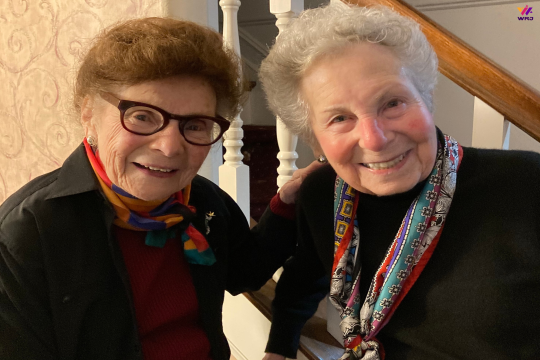
WRJ's Sandy Adland and her daughter, Rachel, holding the WRJ Torah.
Content Warning: This article contains mention of rape.
The movie screen is pitch black. Suddenly, words appear: A long time ago in a galaxy far, far away. After the title logo shrinks away, the words migrate slowly to the screen, only to fade and be replaced by more words that keep moving upward and disappearing. Composer John Williams’ trumpets blare and cymbals crash, and then the soothing violins enter.
Obviously, I am a Star Wars aficionado and a Torah student. I especially adore Princess Leia, the feisty heroine who does have a name. You might be wondering by now, what does Star Wars have to do with Vayishlach, this week’s content-rich Torah parashah? Read on!
A bit of background sets this portion’s scene. Prior to meeting his estranged brother Esau, our patriarch Jacob worries, remembering Esau’s aggressive personality. They had not parted well twenty years ago. Concerned about his family’s welfare, Jacob strategically divides his camp…meaning his sons and their families and properties. Pay attention readers! I said sons. We have no idea what he did with his daughter Dinah. Where is the forgotten Dinah?
In The Torah: A Women’s Commentary published proudly by WRJ and the URJ Press (now the CCAR Press), Rabbi Laura Geller shares a Rashi midrash that claims Dinah was safely locked away in a chest to potentially protect her from Esau. Rabbi Geller posits: “Hiding Dinah…locking her away is a powerful image about silencing a woman. And that silence echoes loudly through the rest of the Torah.”
In my biased opinion, our beloved Bible rarely does justice to women. Our Torah is filled with nameless women only identified as wives or daughters of men who do have names, histories, and legacies.
Furthermore, women like Dinah often utter no words. We never learn Dinah’s response to the assumed rape. We don’t hear Sarah’s reaction to Abraham’s near sacrifice of Isaac. Personally, I would have been a screaming banshee if anyone, let alone my David, would have dared to take either of my girls away from me! But, women in Torah usually lack both names and words.
Did you cheer when you first learned Zelophechad’s daughters’ names? I love that Tamara, Ruth and Naomi, and (midwives) Shifra and Puah all have names. However, when you can easily recite all the named women in Torah, my snarky side might comment, “Houston, we have a problem!”
As toddlers, we learn our names. Does it matter what someone calls you? Does your name mean something to you? Is it important that President Biden’s wife is referred to as Jill or Mrs. Biden or Dr. Biden or the First Lady?? Do titles matter?
I decided to learn how our contemporaries feel about names and titles and conducted a brief, non-scientific poll asking girlfriends about their names and titles. I emailed 39 friends; 30 responded. Here are the questions with responses following. Answers could be yes, no or annotated.
- My name is meaningful to me.
- I want to be addressed with the right title.
- I expect people to use my given name--my first name - casually.
- My name means nothing to me.
- Would you want another name?
- Do you have more than one name?
- Do different people call you different names? Do you respond to those diff. names?
OVERALL, I LEARNED THAT NAMES ARE VERY IMPORTANT TO WOMEN TODAY!!!
Names were meaningful to every woman. One woman shared, “my name is important to my identity.” Some women would have liked to have changed their names when they were children or teenagers, but never as adults. Less than 1% disliked their names currently.
Titles, often hard-earned, mostly mattered in specific settings, and even in those more professional settings, more casual first names were often preferred. Most women enjoyed several ways of being addressed: a first name, ‘mom’, a pet name from a spouse, a loving name from a mother or grandmother, ‘bubbe’, ‘grandma’ or some derivative from grandchildren, etc.
Additionally, most women especially liked the Hebrew or Yiddish name given at birth or chosen. All the women felt a sense of pride in their name. One wrote, “I am proud of my name…my name is important.”
One articulate friend captured the essence of the meaning of a name. She wrote, “It is who I am. I like it. My name is my identity.”
Circling back to my Star Wars analogy, we are not in a galaxy far, far away nor in the desert of our matriarchs. We live in the twenty-first century.We find our names to be meaningful and important. They identify us in the world as well as give us a sense of identity.
As we read Torah this and every week, let us make sure that we pay attention to all the women, named and unnamed, who are part of our people’s legacy. Create contemporary midrash when there are no names or voices to fill in the blank spaces around Torah women. And may all the women in our Torah become a blessing to us.
Shabbat shalom.
(PS. Did you know that the cover on the WRJ Torah is embroidered with the names of all the women in Torah.)
Rosanne M. Selfon, Past President of Women of Reform Judaism (2005-2009) maintains her extensive volunteer career with board service to WRJ, Union for Reform Judaism, and URJ Camp Harlam Council.
Related Posts

Celebrating 100 Years: A Journey Through Time
Celebrating the Mothers of Israel: A Women’s Seder


